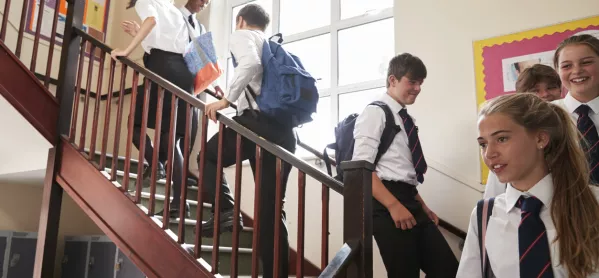Ofqual should backtrack on its standardisation process and award students their teacher-assessed grades, grammar school heads have said.
The handling of this year’s A-level results has led to “a great injustice”, with some students receiving “utterly baffling” grades, according to the Grammar School Heads Association (GSHA).
Mark Fenton, GSHA chief executive, told the BBC he believed the “only fair outcome” would be to use teacher-assessed grades.
A levels 2020:
Top private schools want teacher grades U-turn
A-level ‘chaos’ deepens as Ofqual suspends appeal rules
Review 2-grade markdowns or U-turn, say heads
“Natural justice must surely now trump the understandable desire to maintain national standards in this, the most exceptional of years,” he said.
He also said the government’s 5 per cent cap on extra university places should be lifted.
The cap was introduced in June to prevent the “mass use of unconditional offers” to recruit domestic students, as universities faced “financial losses” caused by “potentially fewer students” wishing to attend in the wake of the Covid-19 outbreak.
At the time, the government said the aim was “to allow students, who want to go to university and meet their entry requirements, to access higher education while avoiding competition among providers taking a form which would go against the interests of students and the sector”.
Grammar school headteacher Kay Mountfield also said she believed teacher-assessed grades should be used - and she had lost trust in Ofqual over its handling of the A-level grades crisis.
The head of Sir William Borlase’s Grammar School in Marlow, Buckinghamshire, told BBC Radio 4‘s Today programme: “I feel that what they have done is they have betrayed people who have gone into this system in good faith, approached the whole process of creating centre-assessed grades with integrity, and they’ve lost our trust by coming out with a set of results which have meant that bright, high-achieving students with aspirations and certainly the ability to go on and do all sorts of things at university have lost their places.
“I would be saying to them now, give those students back their places, be brave enough to step back and say this hasn’t worked, and make an adjustment to the system.
“We have to move to centre-assessed grades because they have been too slow in organising a centralised appeals process.”
Ms Mountfield added that schools like hers have seen “85 per cent of their student cohort downgraded”.
She said: “Only 38 students out of 220 have kept their grades. Eighteen were downgraded by three grades, 74 by two grades and they’re scrabbling about for university places that just aren’t there.
“Seventy of my students have not had their first choice of university - normally that would be about five, or 10 maybe, students. But I have 70 grammar school students, from a range of backgrounds, who have worked very hard for their grades, struggling to get into universities.”




